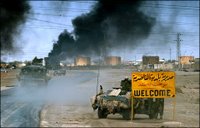Three Years Later

Tomorrow it's three years on the day since Washington and London and some others started the invasion of Iraq.
It was a Wednesday. Everything was already ready to go. Special forces were already starting to discreetly get into the country and into their respective positions.
But suddenly intelligence came in to Washington that Saddam Hussein had been located at a bunker complex called Dora Farm at a bend in the Tigris in the outskirts of Baghdad.
It was a chance that could not be missed. After pondering the options the attack plans were hastily revised. Two F117's with bunker-busting bombs and no less than 36 cruise missiles were sent towards the new target in a major change of the plans for the beginning of the war.
And then the President went on television and announced that it had all started.
Now we know that all of that was wrong. The intelligence on Dora Faem was false. Huge holes in the ground were created at the location, but there were no bunkers, and there had never been any Saddam Hussein.
I mentioning this incident since it is in many ways typical of what happened. Faulty intelligence and hasty decision-making combined. There were, after all, no weapons of mass destruction.
I remember how I before the war predicted four years of difficult war followed by four years of difficult occupation regime of some sort.
The war went faster. It took three weeks to reach and conquer Baghdad. Towards the end Saddam's elite divisions around the capital just melted away. It was a most impressive military campaign.
But then most things went wrong. Washington wasn't ready to confront the realities of taking care of a country after having crushed virtually all its state structures. Regime building was simply not in the handbooks.
Reading the different more detailed accounts published recently, one is shocked by the amateurism of much of the approach. Planeloads of ignorant amateurs were deposited in the Green Zone of Baghdad, micromanaged by equally ignorant amateurs in the Pentagon and with little real knowledge of what they were doing.
I'm saying this with respect for the challenges - we were not necessarily perfect with everything in the Balkans either. But there is little doubt that we were better.
After three years everything in Iraq it is still highly uncertain where it will all end. The ongoing insurgency in parts of the country might be the least of the problems, although it's certainly serious.
Whether the country runs the risk of a civil war or not is largely a matter of definition. Iyad Allawi, the former Prime Minister, the other day noted that "we are losing each day as an average 50 to 60 people throughout the country, if not more - if this is not civil war, then God knows what civil war is."
The really crucial issue, however, is whether the state of Iraq that was created in 1920 can survive - and what will happen if it does not.
Before the war I remember preaching to all that I met in Washington the importance of immediately trying to settle the constitutional issues. Based on Balkan experience, it was obvious that this was the key to the future of the state.
This did not happen. There is a constitution now, but it leaves most of the key issues open. And the window for sorting them out in a matter that will be acceptable to all three of the main groups of the country is closing very rapidly. A few more months, perhaps, but in all probability no more.
For all the mistakes, failures and problems we must honestly ask if keeping Saddam Hussein in place was much of an option.
My view at the time was that we were heading for war sooner or later under any scenario.
There was simply no way that the UN Security Council would lift its all-encompassing economic sanctions against the country as long as Saddam Hussein was in power. The effect of these were clear: they impoverish the country, deepened division between its Arab and Kurdish parts and stengthened the regime.
It was worth trying everything possible to get rid of Saddam Hussein and his regime. The alternative was to accept a continued slide towards a catastrophe that might have been even bigger.
Absent a coup, it was obvious that the entire situation was slipping towards a war, probably later rather than sooner.
9/11 and the Bush presidency changed the equation. To this day a majority of the Iraqis seems to think that the invasion was more good than bad.
But the same Iraqis seem to have an increasingly worried or negative view of what has happened thereafter.
To me, they seem to be right - on both counts.


<< Home